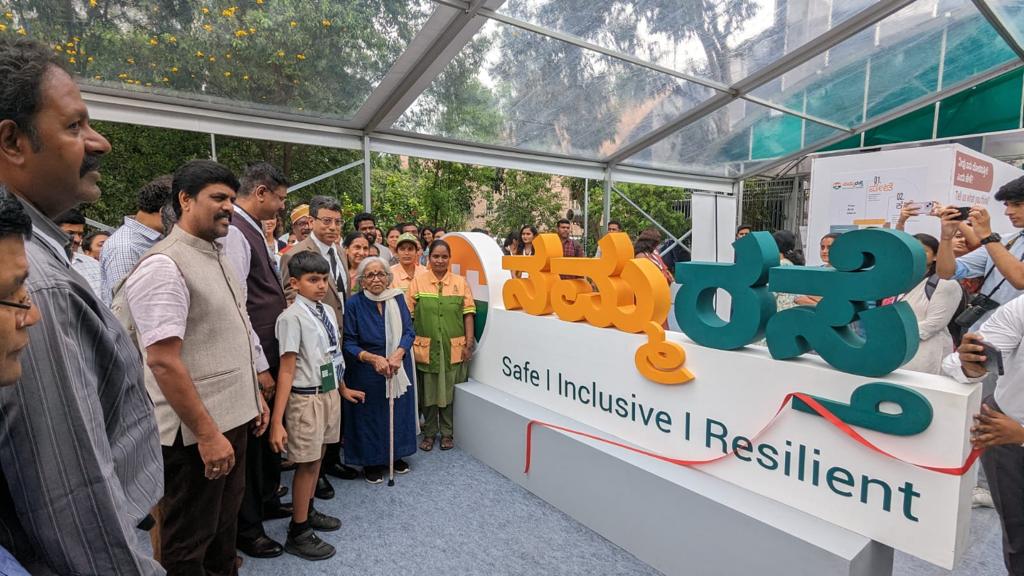- Home
- Newsroom
- Press Notes
- BBMP launches 'Namma Raste' Public Exhibition-Convening Aimed at Towards a Safer, Inclusive & Resilient Bengaluru
BBMP launches 'Namma Raste' Public Exhibition-Convening Aimed at Towards a Safer, Inclusive & Resilient Bengaluru

08 Dec, 2023
Friday, December 8, 2023: Shri Tushar Girinath, Chief Commissioner, Bruhat Bengaluru Mahanagara Palike (BBMP), on December 8, launched ‘Namma Raste’ (Our Streets), a two-day public exhibition and convening, to facilitate discussions towards co-creating solutions to make Bengaluru’s streets and public spaces safer, inclusive, accessible and resilient.
Speaking at the launch, Shri Girinath said, “BBMP envisions a city where every street is pedestrian-friendly, prioritizing the safety and convenience of its citizens. A pedestrian and bicycle friendly city, with adequate green spaces has several health and environmental benefits. Efficient transportation systems with good pedestrian and bicycling infrastructure will ensure a faster and seamless commute, reducing congestion and travel time.”
Namma Raste is organised by BBMP, with WRI India as knowledge partner, under the Bloomberg Philanthropies Initiative for Global Road Safety. This public exhibition, at the Dr. Rajkumar Glass House, showcases human-centric street designs as potential solutions for the city’s road and street network with an extensive mapping of pedestrian infrastructure along key high-risk corridors in the city. Other highlights include a detailed on-ground documentation of challenges faced by citizens and a detailed citizen survey to better understand the Kanakapura road stretch.
Apart from WRI India, over 20 civic organisations and design consultants also showcased their projects at the exhibition. On Day 1, Namma Raste hosted two capacity building workshops with officials from BBMP, Bengaluru Smart City Limited (BenSCL) and Directorate of Urban Land Transport (DULT). With Bengaluru being one of the top 10 finalists of the Nurturing Neighbourhoods Challenge, the ‘Rethinking Public Spaces and Streets for Young Children & Caregivers’ brought together officials from BenSCL and DULT to discuss good practices in scaling up young children and caregiver-friendly public spaces – in early childhood centres, at public plazas and by creating pause points and pocket parks along streets.
The ‘Rethinking Urban Street Design’ workshop focused on making streets safer and more accessible to all road users including pedestrians and improving overall road efficiency. The workshops included hands-on exercises, where participants had to re-design existing junctions and corridors in the city based on the design principles discussed during the workshop.
Pawan Mulukutla, Executive Program Director - Integrated Transport, Clean Air and Hydrogen at WRI India said, “Bengaluru is rapidly expanding. The extended metro lines and added capacity of the suburban railway and buses will improve the overall transport network in the city. However, building access to these networks is critical. We need improved walkable infrastructure to give a boost to the transport system. Namma Raste is a step in this direction. It acts as a platform for the administration, civil society and experts to deliberate and co-create solutions to solve these challenges.”
Building on the success of Day 1, which featured impactful workshops for engineers and officials from various government agencies, on Day 2 (December 9), Namma Raste hosted a series of discussions and talks by experts on rethinking urban street design, moving towards a safer, inclusive, accessible and climate-resilient Bengaluru.
Shri B.S. Prahallad, Engineer-in-Chief, BBMP said, “I congratulate the WRI India team for this event. I have not seen the Glass House being set up this way before. We are committed to improving the footpaths and walkability in Bengaluru, especially for last-mile connectivity. This will also encourage more people to take public transport and reduce the congestion across major transit corridors in Bengaluru.”
He further said “Namme Raste is an important way forward to through light on the significance and value of our streets and public spaces. We have to design and maintain the roads with the people in our hearts. Our streets are for our people, through minimum intervention and maximum impact.”
On Saturday (Dec 9), officials from across government agencies also participated in a panel discussion on 'Street Transformation in Bengaluru' to reflect on the experiences at Namma Raste and pave the way for future projects in the city.
Urban designers from various organisations including Directorate of Urban Land Transport, Venkatramanan Associates, Janaa USP, MS Ramaiah Institute of Management, RampMyCity and Sensing Local shared their experiences in building safer streets and the need to scale up the projects across the city. Claudia Adriazola, Global Director, Health and Road Safety, WRI presented on the best global practices on street transformation and city planning.
Adriazola said, “The ideas shared at Namma Raste underscore the importance of integrating health and road safety into city planning. Bengaluru has the opportunity to lead in creating human-centric street designs that are resilient to climate challenges, and it's heartening to see the commitment from various civic organizations.”
